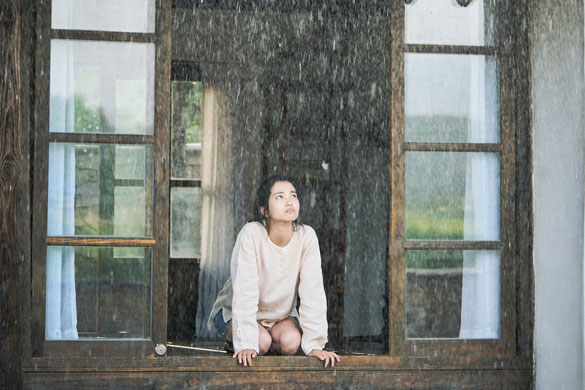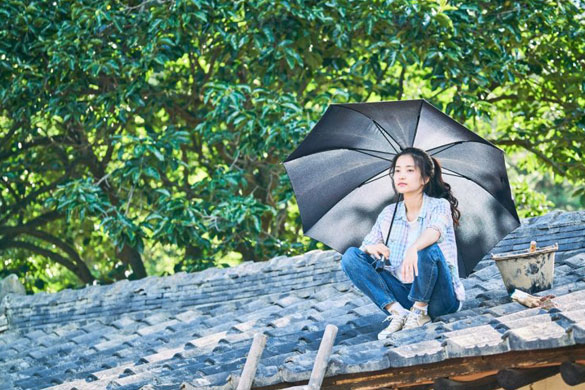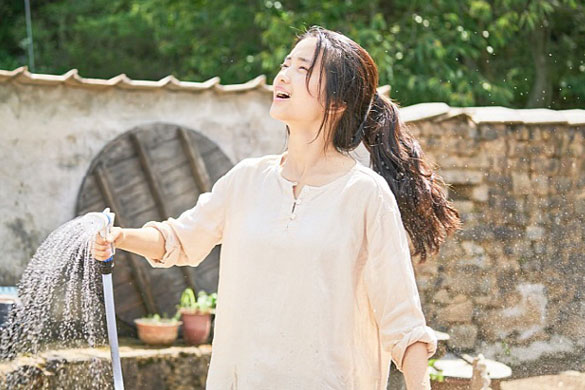
 |
||||
Having been away studying in Seoul, Hae-won (Kim Tae-ri) returns to her family home deep in the Korean countryside when she fails to pass the teachers’ exam. Figuring that just a few days alone spent away from the stresses of urban living will allow her to turn her thoughts and confusion on her future into some semblance of order, she tells no-one she's at her mother's house but in spite of her efforts to stay anonymous and undisturbed, it isn't long before her aunt, her two closest childhood friends, and indeed various nosey, middle-aged women from around the village discover she's there, begin making assumptions about her life, and start asking far too many questions that she frankly doesn't want to, and won't, answer. However, the one set of feelings Hae-won can't hide is her anger at the fact that her mother (Moon So-ri) has taken off to who knows where to “do all the things I gave up to get married and raise you".
Review: How would you describe Korean cinema? While I'm fully aware that answering such a frankly preposterous question would be virtually impossible in anything much less than an almost thesis-length response, your perception of Korean film as a whole will likely have been coloured by the examples you first came into contact with and how your genre viewing preferences have diversified since. Certainly for a time at least, Western viewers (to a huge degree in the UK and to a lesser extent the US) whose beginning forays into Korean cinema came in the early to mid 'noughties' are as likely as not to have first found some of the (later considered classic) K-films released as part of Tartan's Asia Extreme DVD label. Consisting of movies from various East Asian regions with a commonality of extreme content – be it brutally violent thrillers, blood-soaked gorefests, or graphically extreme horrors and the like – the Asia Extreme series certainly did Korean cinema a huge favour in bringing seminal films to international audiences. However, it was so well and prominently marketed that it somewhat overshadowed releases of Korean films from other less confrontational genres (which were admittedly far fewer and far between on the international DVD market) and even for a time led some to believe that Korean films were inherently violent. That is of course a hugely blinkered view (extreme content is certainly a not-insignificant part of Korean cinema but it really is just a chapter in the Korean cinema history portfolio), but while the legacy of Oldboy and the like has been tempered over the years by a greater general audience awareness of a far more diverse range of Korean film genres, it has lingered in the fact that thrillers, action blockbusters and horrors are far more likely to be made available internationally (and more prominently so) than romances, heartfelt dramas and comedies - distributors knowing they're more likely to be an easy sell, at the end of the day. However, there is a Korean cinema trope that is to my mind every bit as important to Korean cinema as a whole as any hard-boiled, blood-soaked content; that is films consisting of profoundly gentle, contemplative stories that are – to paraphrase Tartan – quiet ‘in the extreme’. From the sublime Take Care of My Cat (2001); through 2004's This Charming Girl; to My Mother the Mermaid (also 2004); My Dear Enemy (2008); and beyond, these largely relationship focused films centred on the tiniest of day-to-day moments may have almost whispered narratives but they nonetheless positively scream of life-changing character journeys as monumental as any hard-hitting, extreme tale. With Little Forest, director Yim Soon-rye takes what was originally a Japanese manga and subsequently a two-part live action Japanese film and transplants it to Korea knowing full well that the themes presented will speak directly to Korean audiences and Korean film fans alike, even feeling legitimately Korean in nature, in the process. The fact that Little Forest was given a cinema release in a number of US cities in March 2018 really speaks of the increasing awareness and indeed popularity of small, nuanced Korean films internationally... and that's a big step forward in my book.
Little Forest opens with a short scene showing Hae-won cycling through the sumptuously beautiful, sun-soaked Korean countryside; her brief narration pointing out that she has been back home for three months, living in an area that takes an hour's bike ride simply to get to the nearest village store. Small snippets of narration (always by Hae-won) continue throughout Little Forest, and while in most circumstances I'm not a fan of narration – more often than not I see it as frankly lazy exposition or little more than unnecessary audio filler to detail what viewers can already see is going on on-screen in films that won't allow even a moment's contemplative silence – here it works really well, feeling that we're almost in direct conversation with Hae-won - being confided in on her loves, loathes and annoyances; being given a background to her reasons for and the methods by which she creates her numerous gastronomic delights (more on that in a moment); and even being given an extra insight into the myriad of thoughts and feelings going on in her head, even those she chooses not to share with her two closest friends.
The film's narrative is spilt into the seasons of the years; each altering the farming and cultivation-based lives of the main characters to a huge degree. While Hae-won’s life in Seoul is shown ever so briefly, the contrasts between her urban existence and her idyllic rural life are blatantly on show, nonetheless. Those of you/us who live and work in highly populated urban cityscapes will be wholly aware that the seasons really make little difference in the grander scheme of things. We may be aware of the heat and the cold and indeed the move between seasons but how they affect our day-to-day travails is minimal. We have little choice but to deal with life, whatever it may actually be, on very much a daily, weekly and monthly basis: We get up each day, make the trek to our employment and back, and try to find some sort of work/life balance along the way through our wholly (as far as I'm concerned) unnatural existences. This idea is even referenced in the careers of Hae-won's two friends, Eun-sook and Jae-ha; with Jae-ha drunkenly rambling about how cool his life as a farmer is while Eun-sook repeatedly moans about her job at a bank, even at one point hitting her boss over the head with a tamborine during an enforced late night karaoke session.
LITTLE FOREST (리틀포레스트 / 2018)
|
||||
All images © Megabox PlusM, Watermelon Pictures Review © Paul Quinn |
||||



